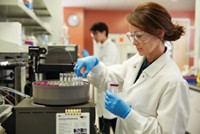Advertisement
Grab your lab coat. Let's get started
Welcome!
Welcome!
Create an account below to get 6 C&EN articles per month, receive newsletters and more - all free.
It seems this is your first time logging in online. Please enter the following information to continue.
As an ACS member you automatically get access to this site. All we need is few more details to create your reading experience.
Not you? Sign in with a different account.
Not you? Sign in with a different account.
ERROR 1
ERROR 1
ERROR 2
ERROR 2
ERROR 2
ERROR 2
ERROR 2
Password and Confirm password must match.
If you have an ACS member number, please enter it here so we can link this account to your membership. (optional)
ERROR 2
ACS values your privacy. By submitting your information, you are gaining access to C&EN and subscribing to our weekly newsletter. We use the information you provide to make your reading experience better, and we will never sell your data to third party members.
Business
Big pharma pursues next generation of antibodies
AbbVie and other big firms pay small ones to access new technologies
by Ann M. Thayer
April 29, 2016
| A version of this story appeared in
Volume 94, Issue 18

Seeing monoclonal antibodies rank among the top-selling pharmaceuticals, major drug companies are investing in the next generation of engineered antibodies and antibody-drug conjugates (ADCs).
Leading the way is AbbVie, which had $14 billion in sales last year of the top-selling antibody, Humira, but faces looming patent expirations on the anti-inflammatory drug.
AbbVie will pay $5.8 billion in cash and stock to acquire Stemcentrx, an eight-year-old company that has five oncology agents in clinical trials. The most advanced candidate is Rova-T, a rovalpituzumab tesirine ADC in Phase III trials against small cell lung cancer. AbbVie could pay Stemcentrx shareholders another $4 billion in milestone payments.
At the same time, AbbVie will pay $40 million up front and up to $645 million in milestones to help Argenx develop its preclinical cancer immunotherapy ARGX-115. The Dutch firm engineers the targeting, binding, and other features of antibodies created within the immune system of llamas.
And AbbVie will spend another $30 million up front and up to $470 million more to work with CytomX Therapeutics, which designs ADCs that deliver cytotoxic payloads to tumor cells while avoiding healthy cells. An initial target will be the tumor antigen CD17.
Meanwhile, GlaxoSmithKline is investing $36 million up front and up to $872 million in milestones to get Zymeworks’ technology for generating bispecific antibodies. And Takeda Pharmaceutical and Eli Lilly & Co. have struck agreements with Adimab, a developer of monoclonal and bispecific antibodies.
With only a handful approved, ADCs and engineered or bispecific antibodies are niche products. But 50 or more of each are in development, and annual market growth could reach 40%, according to the market research firm Roots Analysis. ADC sales, for example, are predicted to grow from about $1 billion today to $10 billion by 2025.
“Monoclonals are very useful, but we are seeing more and more cases where we need extra punch or oomph, and that is where bispecifics and ADCs come in,” says David Poon, Zymeworks’ director of R&D alliances. “One of our lead compounds is a bispecific drug conjugate, so we are actually already thinking about combining different aspects of these next-generation platforms.”



Join the conversation
Contact the reporter
Submit a Letter to the Editor for publication
Engage with us on Twitter